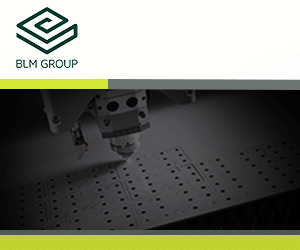Do Your Homework to Realize the Advantages of Used Equipment
Shipment delays and supply chain bottlenecks can prevent new machinery from being delivered on time, as an example, and imped efficient production and opportunities for growth. One option is to purchase used equipment, which is readily available and less expensive.
Posted: January 3, 2022
PROFIT MASTERY
By Julie Murphy
Despite the global pandemic, there has been a surge in manufacturing growth and current predictions for growth in 2022 range from 15% to 22%, depending on the market. However, this growth is tempered with delays in machine shipments due to shortages of key components such as silicon chips, circuit boards and other raw materials.
So, what does a manufacturing or fabrication shop do when they can’t find a new machine to purchase to fulfill a contract? Consider purchasing a used machine.
Buying used equipment can be a great way to obtain additional equipment, and until recently, when delays in shipments of new machines have extended lead times on new equipment, used equipment can typically be purchased at reasonable prices.
If you do consider buying used equipment, there are some factors you should consider before making that purchase.
BENEFITS OF BUYING USED EQUIPMENT
- Lower cost than buying new equipment – Used equipment can typically be purchased at a fraction* of the cost of buying new. Additionally, because the purchase price is lower you will save money on sales tax.
- Initial depreciation is already taken – Asset depreciation begins immediately after a piece of equipment is put into service. Buying used equipment means that a portion of the depreciation has already been realized.
- Increased cash flow – Spending less on your equipment purchase preserves capital and means you have more cash to fund business operations and other investments.
- Availability – Used machinery is typically readily available and once you’ve done your due diligence and made your purchase it can quickly be put into service – no need to place an order with a dealer and wait for long delivery times. This means you are operational sooner and generating revenue faster.
- Tax Benefits – Used equipment acquisitions can enjoy similar tax benefits as new equipment, including being eligible for Section 179 and bonus depreciation tax deductions.
WHERE CAN YOU PURCHASE USED EQUIPMENT?
Used equipment can be found in a variety places and it’s important to understand the various options.
- Auctions – Auctions are great places to research and purchase used equipment. Typically auctions have a variety of equipment types and brands and selection is normally large. Some of the larger auction houses have multiple locations and offer online bidding so you can buy from nearly anywhere. They also typically offer title searches, maintenance records, warranties, and can arrange transportation once purchased. One caveat is that because sales occur as auctions, prices can get bid up so you may not get the pricing deal you originally thought.
- Equipment dealers – Many dealers take used equipment as trade-ins or have previously rented machines available for sale, however selection will be limited to what they have in stock. Benefits of purchasing from a dealer include being able to personally inspect the equipment (if the dealer is located nearby), being able to negotiate the price, and service and support after the sale.
- Online marketplaces – Online marketplaces are good places to find a wide variety of equipment and can be used to compare brands, features and pricing. Be certain the marketplace has a good reputation and strong security features, including dispute resolution services.
- Private parties – These are individuals or non-dealer businesses that are looking to sell existing equipment. Sometimes they are looking to upgrade and didn’t get the trade-in price they wanted, or they simply want to decrease their fleet. When purchasing from a private party it’s critical to perform a thorough inspection, conduct pricing research, and ensure the seller has free and clear title to the equipment being sold. Before you make your purchase, ensure that you have cash or financing lined up. Many lenders won’t finance private party sales, so you can’t make an assumption that you can get financing after the deal has been struck.
It’s always a good idea to do some research on the seller, especially if it’s not a nationally recognized auction house or dealer. You want to make sure the seller is reliable and trustworthy. Ask the seller for references, consult with peers and/or local dealers, and if possible, meet with the seller in person (taking necessary health precautions, of course). Also, make sure the seller can transfer good title to the equipment to you free and clear of any liens.
FINANCING USED EQUIPMENT
Even though you can typically purchase used equipment at a fraction of the cost of new, some used equipment still comes with hefty price tags, so you may not have available funds to pay cash. That’s when you need to seek out a lender that will finance used equipment. Not all lenders will.
When a lender considers financing used equipment, they will want information that helps them understand the condition and value of the equipment. Detailed specifications, inspection reports, hours and/or mileage and maintenance records will help the lender assess the value so they can determine the amount they are willing to loan.
Often, interest rates don’t differ between new and used equipment loans but depending on the type of equipment, its condition and its general lifespan, term length can vary. For example, a high-end CNC machine tool could have a life expectancy of 10-20 years (or more), so it is not unreasonable to have a loan term length of 5-7 years. But a five-year-old, heavily used entry-level piece of equipment may not have much life left, so loan terms won’t be as long.
DUE DILIGENCE
Regardless of where you purchase your used equipment or how you pay for it, take time to do some due diligence on your investment. Make sure you do the following:
- Request an inspection report, ownership history and maintenance records
- Ask if any repairs, upgrades or refurbishments have been made to the machine
- Inspect the equipment
- Inquire about the availability of a warranty
- Understand what options or accessories are included with the purchase
- Conduct pricing research to ensure you are getting a good value
- Ask about additional fees – commissions, surcharges, shipping/handling, etc.
- Ensure you can get a clear title (most important when purchasing from private sellers)
- Choose a financing partner that knows your industry and the type of equipment you want to buy
- If financing the purchase, get pre-approved prior to striking your final deal
Purchasing used equipment can be a viable alternative to purchasing new equipment and it can often save time and money. Make sure to do your homework and have your payment and/or financing locked up before you negotiate. Consult your local equipment dealers and financing partners for assistance and information to ensure you get the most from your purchase.
End Note
* The pandemic has caused delays in shipments of some new equipment, driving up demand for, and prices of, used equipment.















